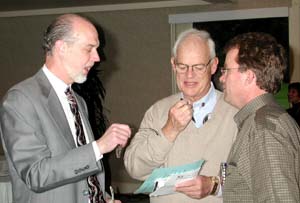|
Transportation: Purgatory or Hell?
|

Bob Watt (L) talks with Jim Owens and Chris Monger (R) after Friday’s meeting.
|
The weekly meeting of the Bellevue Breakfast Rotary Club concentrated on the woes surrounding solving transportation problems in Washington. Our speaker was Bob Watt, President and CEO of the Greater Seattle Chamber of Commerce. He was introduced by Jeff Cashman.
“Twenty years of population growth have created a crisis,” Watt opined. “There has been a huge increase in the number of jobs. The miles traveled daily by workers and those who serve them have increased. Seattle has the second-worst congestion in the country, mainly because alternatives for commuters are almost nil.”
Metropolitan areas face different congestion challenges. “The traffic problem in Western Washington is not a priority for Eastern Washington legislators. This makes it difficult to get a consensus on solving transportation problems.”
People are living further from their jobs, as King County’s housing costs have forced people to move beyond. All this does is increase the amount of traffic on the roadways and increase the miles traveled daily.
Special committees meeting to determine “The Need” have come up with a total of $200 billion to fund projects over the next 20 years. The committee recognized that that number was out of sight and chopped $50 billion from that project and said that “$150 billion over the next 20 years” is what it will take to just stay even. Current revenues will raise $55 billion over 20 years.
The planners have listed some of the things that will have to happen if the money isn’t there: re-prioritize projects, permit reform, increase efficiencies, conduct cost-benefit analyses, optimize planning and the use of technology, and reduce demand. When the Motor Vehicle Tax was nearly eliminated, the source for funds dropped dramatically, making today’s decision even tougher.
Doug McDonald is the new head of the Washington Department of Transportation. “He’s a native Washingtonian and has made significant inroads in shaping up the DOT.” He’s identified six critical elements that must be adopted in order for progress on transportation issues:
- Establish benchmarks and measure progress.
- Increase accountability and efficiencies.
- Invest to keep the state system strong.
- Empower regions to fix their own problems.
- Ensure funding will address needs.
- Adopt the early action strategy.
Watt noted that in order to get votes for roads and transit programs, the legislature has to put projects in all legislator’s home districts. Using I-405 as an example, Watt said the “hours of congestion per day are intolerable.” On the plan, Alternative #3 adds one new general purpose lane north and south at a cost of $7.1 billion. Before final engineering is in place, the price will inevitably go up. “But, we’ve got to pay for it, because companies doing business in the Puget Sound region will depart. Having underinvested for 20 years, they’re not about to watch further deterioration of the transportation system. We’re in crisis.”
So, what can you do? “Contact the Governor’s office demanding a package of transportation measures that will effectively begin the process of catching up. Contact your legislators. Let them know what you think. If the King County delegation would get together, they could pass a program. Eastside legislators (East of Lake Washington) are crucial to passage of any transportation legislation.”
Transportation has to be the number one priority for the legislature in January. “Don’t give a dime to their campaign if they can’t promise to work for transportation.” The Seattle Chamber has linked with Bellevue Chamber to support changes in the state’s transportation program.
Questions:
Tolls? Yes, being considered. Thorny problem. Geography doesn’t allow an easy way out for alternatives.
New construction tolled? People don’t like it.
Underground construction? Very costly.
Three-county regional authority to run transportation in King, Snohomish and Pierce counties? Yes, this is a distinct possibility. In fact, it would be something that legislators outside this area would fear. More money for roads goes from the populated areas to the sparsely-populated areas and they would miss these funds if a new regional authority was established.
When could be expect things to get better? We’re so far behind, it will keep us from continued growth. A 10 cent/gallon gas tax increase will be helpful.
Comment on Sound Transit: Heavy rail, good job. Busses, great job. Bungled Light Rail. Tunnel became unaffordable. Don’t know what it will cost until they get the bids. No additional Right of Way thru Seattle.
Don Deasy said, “If it doesn’t get better, the businesses who threatened to leave will do so. Then, there will be no traffic problems. So what?
Bob Watt says we may have to take little steps.
For his presentation, President Goldfarb gave Bob a certificate showing a donation of 600 pounds of food made to Rotary First Harvest.
|